Euthanasia: Evaluating Arguments for and Against in Terminal Illness
VerifiedAdded on 2023/06/11
|5
|1228
|208
Essay
AI Summary
This essay examines the complex issue of euthanasia, focusing on the debate around whether severely ill patients, particularly those with terminal illnesses like cancer, should have the right to choose to end their suffering with dignity. It presents arguments both for and against euthanasia, considering ethical, legal, and religious perspectives. The essay also contrasts euthanasia with palliative care, highlighting concerns about potential abuses and the importance of addressing depression in patients considering end-of-life decisions. Ultimately, it navigates the tension between patient autonomy and the protection of vulnerable individuals within the healthcare system. Desklib offers this essay and other study resources for students.
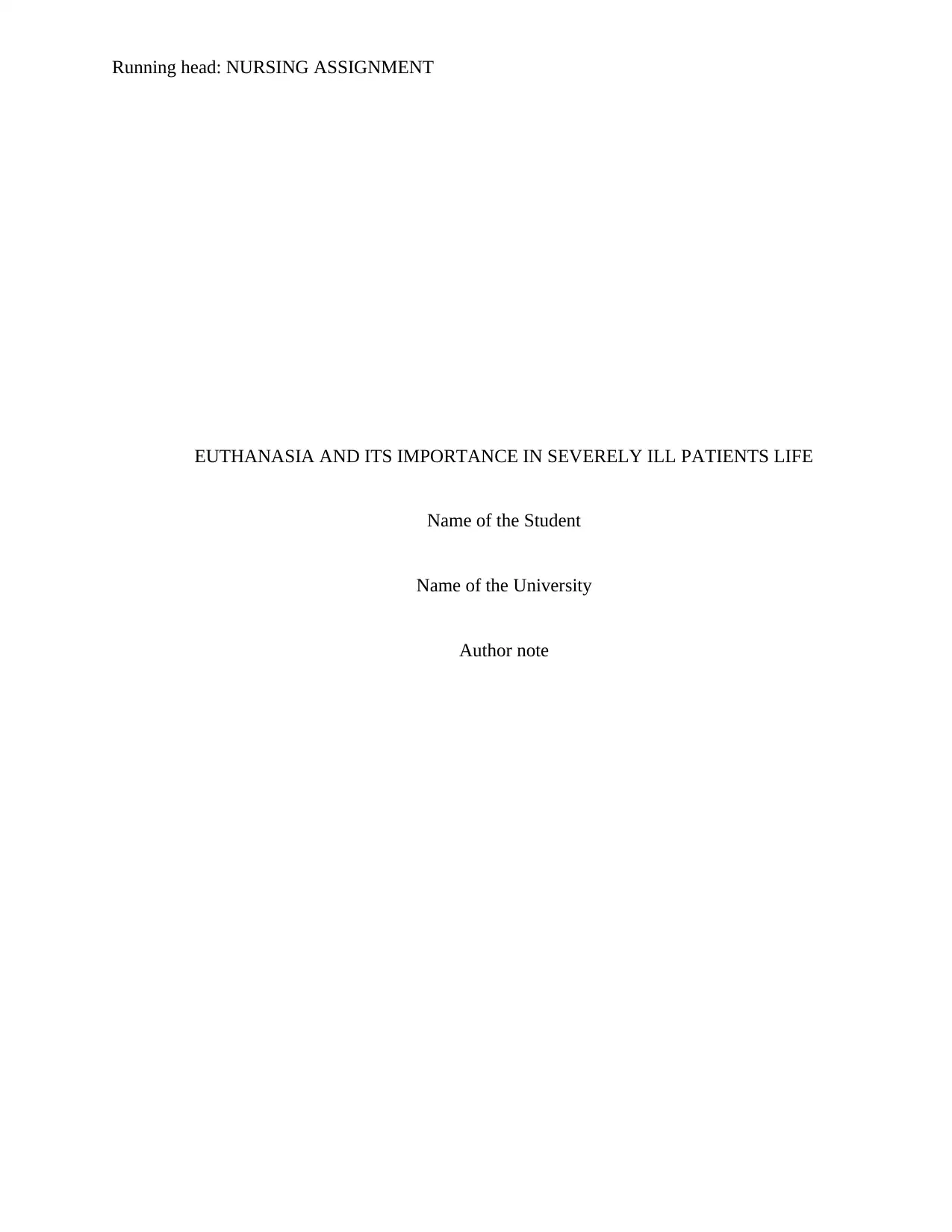
Running head: NURSING ASSIGNMENT
EUTHANASIA AND ITS IMPORTANCE IN SEVERELY ILL PATIENTS LIFE
Name of the Student
Name of the University
Author note
EUTHANASIA AND ITS IMPORTANCE IN SEVERELY ILL PATIENTS LIFE
Name of the Student
Name of the University
Author note
Paraphrase This Document
Need a fresh take? Get an instant paraphrase of this document with our AI Paraphraser
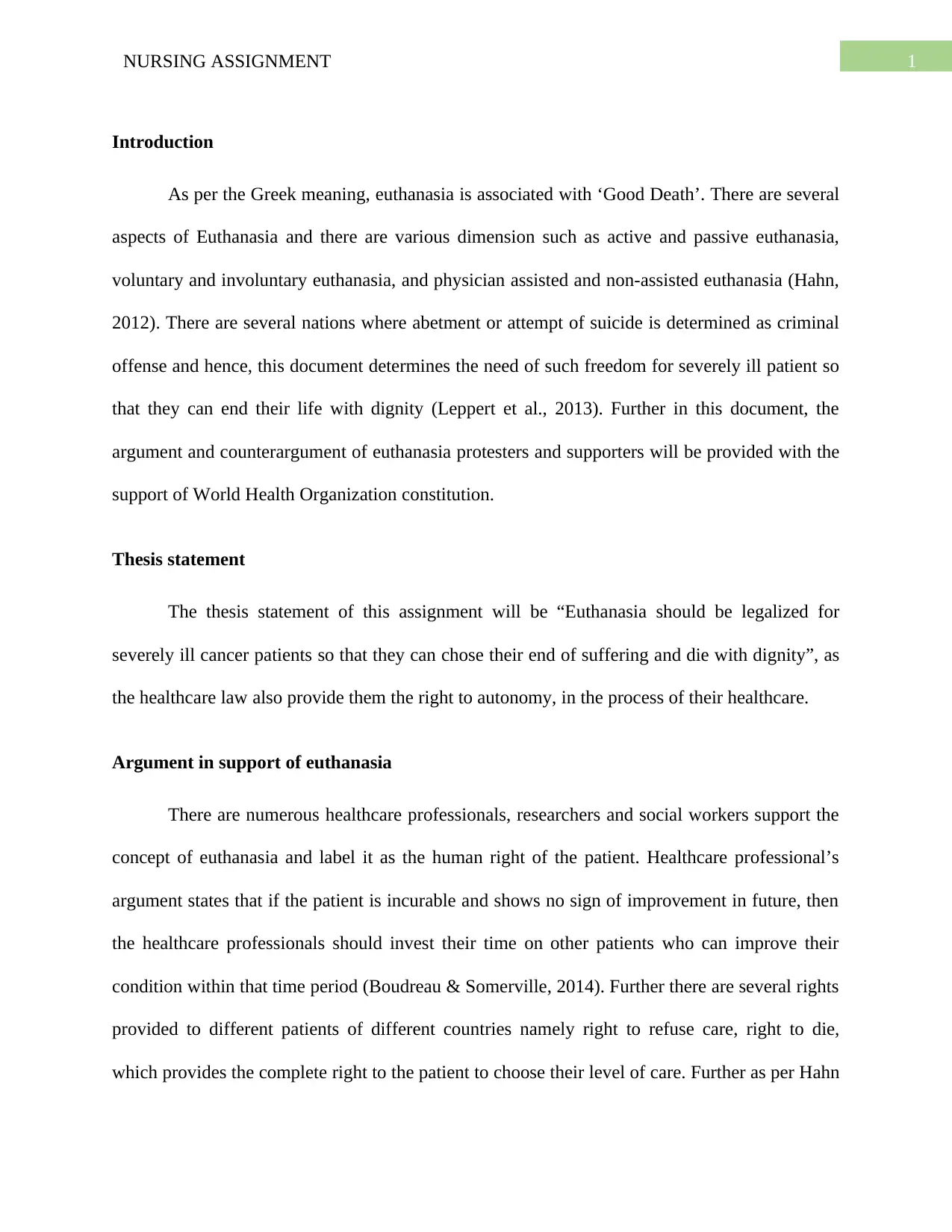
1NURSING ASSIGNMENT
Introduction
As per the Greek meaning, euthanasia is associated with ‘Good Death’. There are several
aspects of Euthanasia and there are various dimension such as active and passive euthanasia,
voluntary and involuntary euthanasia, and physician assisted and non-assisted euthanasia (Hahn,
2012). There are several nations where abetment or attempt of suicide is determined as criminal
offense and hence, this document determines the need of such freedom for severely ill patient so
that they can end their life with dignity (Leppert et al., 2013). Further in this document, the
argument and counterargument of euthanasia protesters and supporters will be provided with the
support of World Health Organization constitution.
Thesis statement
The thesis statement of this assignment will be “Euthanasia should be legalized for
severely ill cancer patients so that they can chose their end of suffering and die with dignity”, as
the healthcare law also provide them the right to autonomy, in the process of their healthcare.
Argument in support of euthanasia
There are numerous healthcare professionals, researchers and social workers support the
concept of euthanasia and label it as the human right of the patient. Healthcare professional’s
argument states that if the patient is incurable and shows no sign of improvement in future, then
the healthcare professionals should invest their time on other patients who can improve their
condition within that time period (Boudreau & Somerville, 2014). Further there are several rights
provided to different patients of different countries namely right to refuse care, right to die,
which provides the complete right to the patient to choose their level of care. Further as per Hahn
Introduction
As per the Greek meaning, euthanasia is associated with ‘Good Death’. There are several
aspects of Euthanasia and there are various dimension such as active and passive euthanasia,
voluntary and involuntary euthanasia, and physician assisted and non-assisted euthanasia (Hahn,
2012). There are several nations where abetment or attempt of suicide is determined as criminal
offense and hence, this document determines the need of such freedom for severely ill patient so
that they can end their life with dignity (Leppert et al., 2013). Further in this document, the
argument and counterargument of euthanasia protesters and supporters will be provided with the
support of World Health Organization constitution.
Thesis statement
The thesis statement of this assignment will be “Euthanasia should be legalized for
severely ill cancer patients so that they can chose their end of suffering and die with dignity”, as
the healthcare law also provide them the right to autonomy, in the process of their healthcare.
Argument in support of euthanasia
There are numerous healthcare professionals, researchers and social workers support the
concept of euthanasia and label it as the human right of the patient. Healthcare professional’s
argument states that if the patient is incurable and shows no sign of improvement in future, then
the healthcare professionals should invest their time on other patients who can improve their
condition within that time period (Boudreau & Somerville, 2014). Further there are several rights
provided to different patients of different countries namely right to refuse care, right to die,
which provides the complete right to the patient to choose their level of care. Further as per Hahn
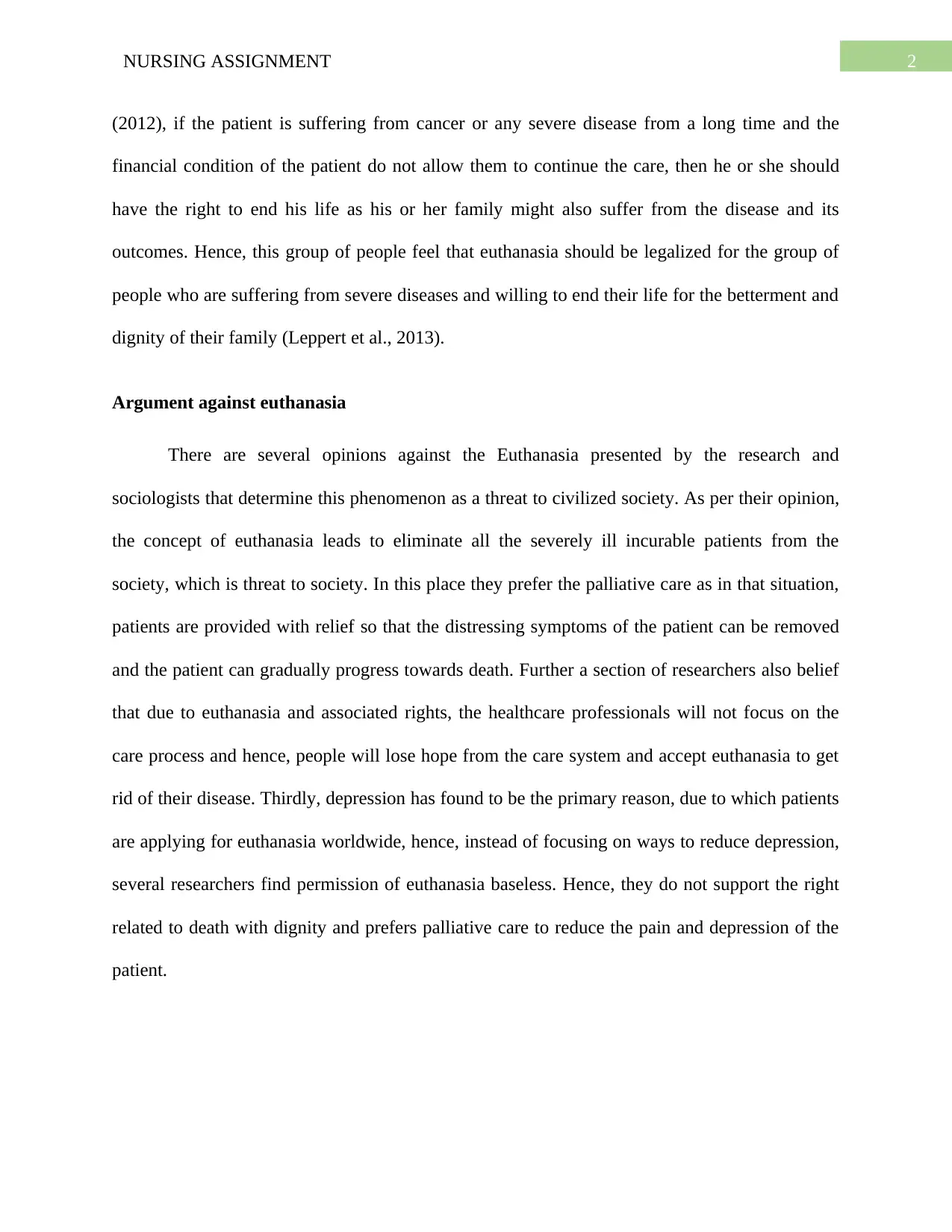
2NURSING ASSIGNMENT
(2012), if the patient is suffering from cancer or any severe disease from a long time and the
financial condition of the patient do not allow them to continue the care, then he or she should
have the right to end his life as his or her family might also suffer from the disease and its
outcomes. Hence, this group of people feel that euthanasia should be legalized for the group of
people who are suffering from severe diseases and willing to end their life for the betterment and
dignity of their family (Leppert et al., 2013).
Argument against euthanasia
There are several opinions against the Euthanasia presented by the research and
sociologists that determine this phenomenon as a threat to civilized society. As per their opinion,
the concept of euthanasia leads to eliminate all the severely ill incurable patients from the
society, which is threat to society. In this place they prefer the palliative care as in that situation,
patients are provided with relief so that the distressing symptoms of the patient can be removed
and the patient can gradually progress towards death. Further a section of researchers also belief
that due to euthanasia and associated rights, the healthcare professionals will not focus on the
care process and hence, people will lose hope from the care system and accept euthanasia to get
rid of their disease. Thirdly, depression has found to be the primary reason, due to which patients
are applying for euthanasia worldwide, hence, instead of focusing on ways to reduce depression,
several researchers find permission of euthanasia baseless. Hence, they do not support the right
related to death with dignity and prefers palliative care to reduce the pain and depression of the
patient.
(2012), if the patient is suffering from cancer or any severe disease from a long time and the
financial condition of the patient do not allow them to continue the care, then he or she should
have the right to end his life as his or her family might also suffer from the disease and its
outcomes. Hence, this group of people feel that euthanasia should be legalized for the group of
people who are suffering from severe diseases and willing to end their life for the betterment and
dignity of their family (Leppert et al., 2013).
Argument against euthanasia
There are several opinions against the Euthanasia presented by the research and
sociologists that determine this phenomenon as a threat to civilized society. As per their opinion,
the concept of euthanasia leads to eliminate all the severely ill incurable patients from the
society, which is threat to society. In this place they prefer the palliative care as in that situation,
patients are provided with relief so that the distressing symptoms of the patient can be removed
and the patient can gradually progress towards death. Further a section of researchers also belief
that due to euthanasia and associated rights, the healthcare professionals will not focus on the
care process and hence, people will lose hope from the care system and accept euthanasia to get
rid of their disease. Thirdly, depression has found to be the primary reason, due to which patients
are applying for euthanasia worldwide, hence, instead of focusing on ways to reduce depression,
several researchers find permission of euthanasia baseless. Hence, they do not support the right
related to death with dignity and prefers palliative care to reduce the pain and depression of the
patient.
⊘ This is a preview!⊘
Do you want full access?
Subscribe today to unlock all pages.

Trusted by 1+ million students worldwide
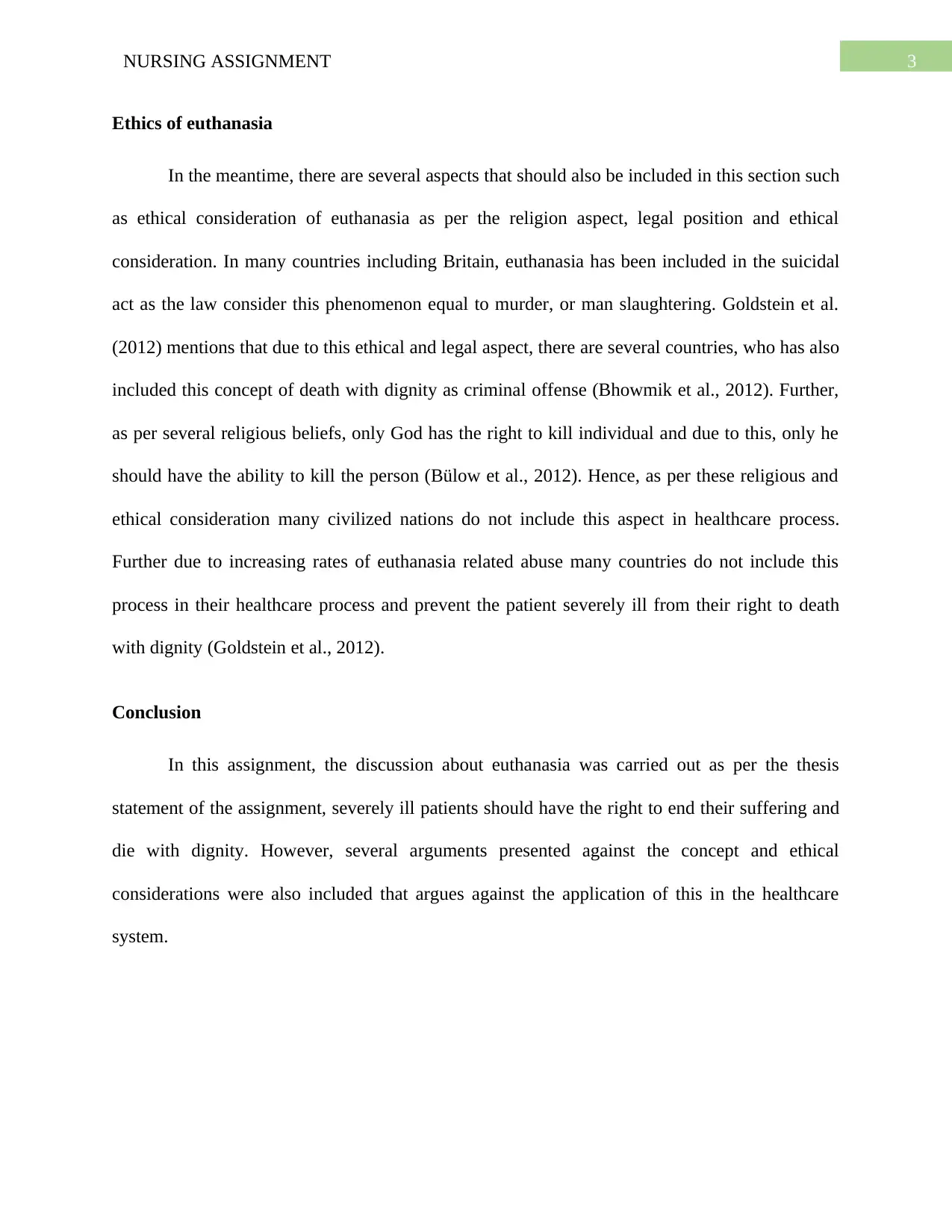
3NURSING ASSIGNMENT
Ethics of euthanasia
In the meantime, there are several aspects that should also be included in this section such
as ethical consideration of euthanasia as per the religion aspect, legal position and ethical
consideration. In many countries including Britain, euthanasia has been included in the suicidal
act as the law consider this phenomenon equal to murder, or man slaughtering. Goldstein et al.
(2012) mentions that due to this ethical and legal aspect, there are several countries, who has also
included this concept of death with dignity as criminal offense (Bhowmik et al., 2012). Further,
as per several religious beliefs, only God has the right to kill individual and due to this, only he
should have the ability to kill the person (Bülow et al., 2012). Hence, as per these religious and
ethical consideration many civilized nations do not include this aspect in healthcare process.
Further due to increasing rates of euthanasia related abuse many countries do not include this
process in their healthcare process and prevent the patient severely ill from their right to death
with dignity (Goldstein et al., 2012).
Conclusion
In this assignment, the discussion about euthanasia was carried out as per the thesis
statement of the assignment, severely ill patients should have the right to end their suffering and
die with dignity. However, several arguments presented against the concept and ethical
considerations were also included that argues against the application of this in the healthcare
system.
Ethics of euthanasia
In the meantime, there are several aspects that should also be included in this section such
as ethical consideration of euthanasia as per the religion aspect, legal position and ethical
consideration. In many countries including Britain, euthanasia has been included in the suicidal
act as the law consider this phenomenon equal to murder, or man slaughtering. Goldstein et al.
(2012) mentions that due to this ethical and legal aspect, there are several countries, who has also
included this concept of death with dignity as criminal offense (Bhowmik et al., 2012). Further,
as per several religious beliefs, only God has the right to kill individual and due to this, only he
should have the ability to kill the person (Bülow et al., 2012). Hence, as per these religious and
ethical consideration many civilized nations do not include this aspect in healthcare process.
Further due to increasing rates of euthanasia related abuse many countries do not include this
process in their healthcare process and prevent the patient severely ill from their right to death
with dignity (Goldstein et al., 2012).
Conclusion
In this assignment, the discussion about euthanasia was carried out as per the thesis
statement of the assignment, severely ill patients should have the right to end their suffering and
die with dignity. However, several arguments presented against the concept and ethical
considerations were also included that argues against the application of this in the healthcare
system.
Paraphrase This Document
Need a fresh take? Get an instant paraphrase of this document with our AI Paraphraser
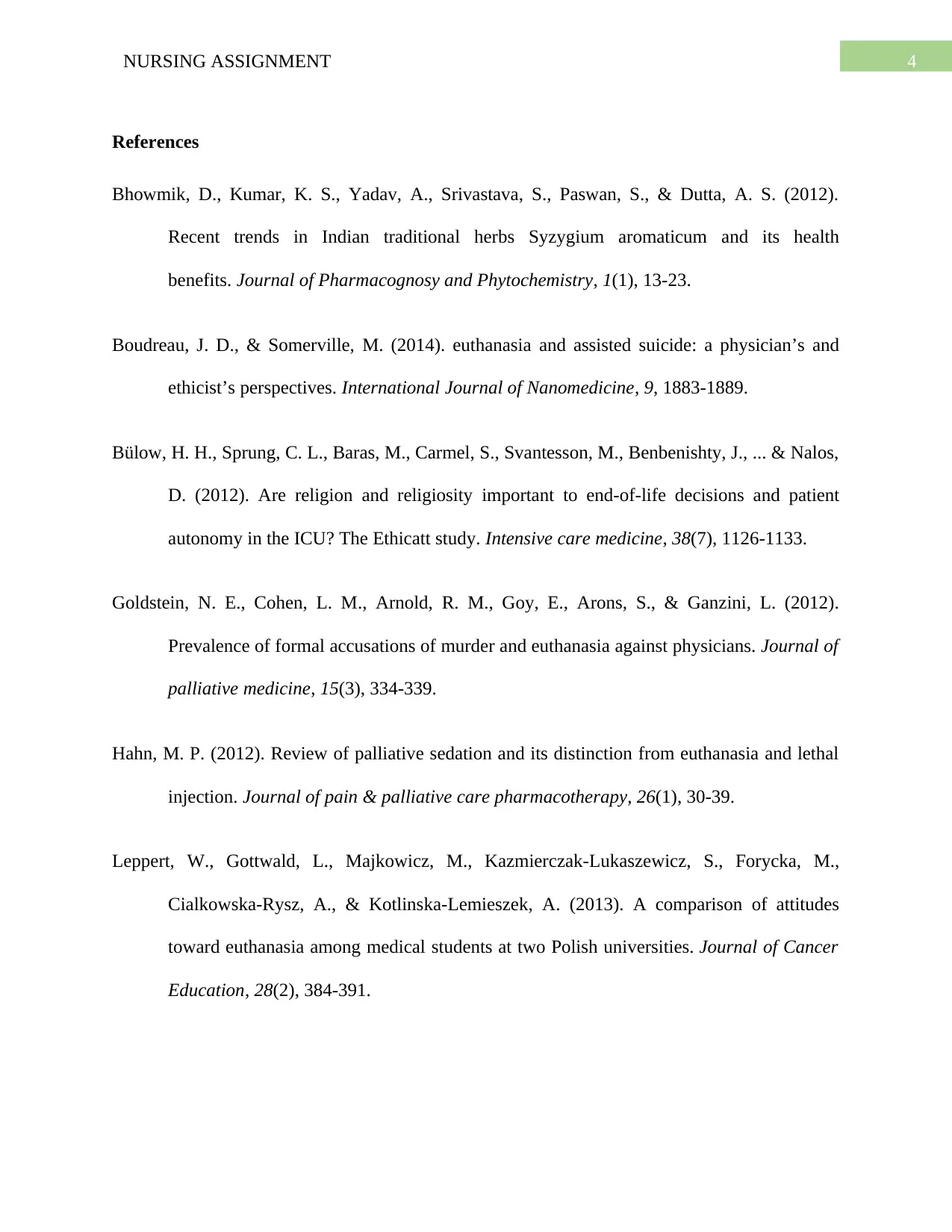
4NURSING ASSIGNMENT
References
Bhowmik, D., Kumar, K. S., Yadav, A., Srivastava, S., Paswan, S., & Dutta, A. S. (2012).
Recent trends in Indian traditional herbs Syzygium aromaticum and its health
benefits. Journal of Pharmacognosy and Phytochemistry, 1(1), 13-23.
Boudreau, J. D., & Somerville, M. (2014). euthanasia and assisted suicide: a physician’s and
ethicist’s perspectives. International Journal of Nanomedicine, 9, 1883-1889.
Bülow, H. H., Sprung, C. L., Baras, M., Carmel, S., Svantesson, M., Benbenishty, J., ... & Nalos,
D. (2012). Are religion and religiosity important to end-of-life decisions and patient
autonomy in the ICU? The Ethicatt study. Intensive care medicine, 38(7), 1126-1133.
Goldstein, N. E., Cohen, L. M., Arnold, R. M., Goy, E., Arons, S., & Ganzini, L. (2012).
Prevalence of formal accusations of murder and euthanasia against physicians. Journal of
palliative medicine, 15(3), 334-339.
Hahn, M. P. (2012). Review of palliative sedation and its distinction from euthanasia and lethal
injection. Journal of pain & palliative care pharmacotherapy, 26(1), 30-39.
Leppert, W., Gottwald, L., Majkowicz, M., Kazmierczak-Lukaszewicz, S., Forycka, M.,
Cialkowska-Rysz, A., & Kotlinska-Lemieszek, A. (2013). A comparison of attitudes
toward euthanasia among medical students at two Polish universities. Journal of Cancer
Education, 28(2), 384-391.
References
Bhowmik, D., Kumar, K. S., Yadav, A., Srivastava, S., Paswan, S., & Dutta, A. S. (2012).
Recent trends in Indian traditional herbs Syzygium aromaticum and its health
benefits. Journal of Pharmacognosy and Phytochemistry, 1(1), 13-23.
Boudreau, J. D., & Somerville, M. (2014). euthanasia and assisted suicide: a physician’s and
ethicist’s perspectives. International Journal of Nanomedicine, 9, 1883-1889.
Bülow, H. H., Sprung, C. L., Baras, M., Carmel, S., Svantesson, M., Benbenishty, J., ... & Nalos,
D. (2012). Are religion and religiosity important to end-of-life decisions and patient
autonomy in the ICU? The Ethicatt study. Intensive care medicine, 38(7), 1126-1133.
Goldstein, N. E., Cohen, L. M., Arnold, R. M., Goy, E., Arons, S., & Ganzini, L. (2012).
Prevalence of formal accusations of murder and euthanasia against physicians. Journal of
palliative medicine, 15(3), 334-339.
Hahn, M. P. (2012). Review of palliative sedation and its distinction from euthanasia and lethal
injection. Journal of pain & palliative care pharmacotherapy, 26(1), 30-39.
Leppert, W., Gottwald, L., Majkowicz, M., Kazmierczak-Lukaszewicz, S., Forycka, M.,
Cialkowska-Rysz, A., & Kotlinska-Lemieszek, A. (2013). A comparison of attitudes
toward euthanasia among medical students at two Polish universities. Journal of Cancer
Education, 28(2), 384-391.
1 out of 5
Related Documents
Your All-in-One AI-Powered Toolkit for Academic Success.
+13062052269
info@desklib.com
Available 24*7 on WhatsApp / Email
![[object Object]](/_next/static/media/star-bottom.7253800d.svg)
Unlock your academic potential
Copyright © 2020–2026 A2Z Services. All Rights Reserved. Developed and managed by ZUCOL.




